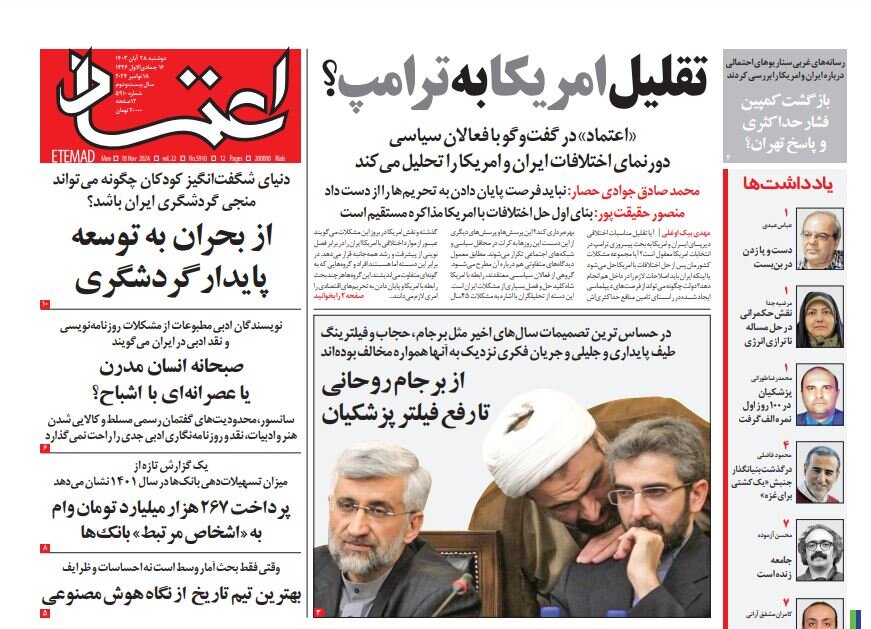Obstruction in relations between Iran and U.S.

TEHRAN - In an interview with Masoumeh Ebtekar, a reformist political activist, Etemad evaluated the role of those who benefit from sanctions in blocking the relations between Iran and America.
She said: Basically, the ‘sanctions beneficiaries will not allow Iran's ties with the U.S. and Europe to be resolved and the sanctions get lifted. Undoubtedly, with the presence of Trump, they will again try to consider their interests instead of national interests. The government of Pezeshkian should put an end to this anti-national profession. The Republicans will take full control of the ruling establishment in America soon. Perhaps, when Trump declared that he was not looking for tension and was looking for a solution to the nuclear problem with Iran, some differences could be seen in his approach. Of course, Iran has shown its ability and capabilities in the military field in recent months, and the whole world acknowledges that despite decades of sanctions, Iran has been able to upgrade its defense system. We hope that these measures will, on the one hand, fulfill the interests of Iranians and on the other hand, a ceasefire in the region and an end to the crimes and brutal killings of the Israelis.
Arman-e-Melli: Which direction will Iran-US admin go?
In an interview with Hassan Beheshtipour, an international relations analyst, Arman-e-Melli discussed the prospects of Iran-U.S. relations. He said: It is unlikely that Trump will follow the path of military confrontation with Iran because he knows that if he enters into a direct military conflict with Iran, he will be involved in a regional war. Trump is a deal maker and is waiting to evaluate how to work with the Russians and the Chinese and how he can strike a deal with Iran. On the other hand, if some people seek a military confrontation in Iran's internal politics, they are only spreading provocative thoughts. However, whenever the security and political officials of the new (American) administration are determined, it is possible to more accurately predict the approach of the Trump administration in the coming months. But the reality is that Iran is not looking for confrontation, but for interaction, so the space for this interaction should be created with time. Tensions between Tehran and Washington must be managed. Managing tension is about how to engage with Trump, but if Trump is looking for an all-out confrontation, we have to stand up to him.
Jam-e-Jam: Trump's second admin is more anti-Iran
Jam-e-Jam wrote after Trump's victory in the American presidential election, some people analyzed that his second administration would be different from his first one. It seems such interpretations mainly originate from “destructive optimism” about Trump's policies in the new era. The fact is that the second administration of Donald Trump is fundamentally different from his first administration. These differences are in line with the future American government’s extremist approach, especially in dealing with the Islamic Republic of Iran. Therefore, it is not true to think that Trump's policies towards Iran are supposed to be more realistic and based on interaction. There were no normal conditions to take steps toward an agreement or serious negotiations even during the rule of the Democrats, let alone when the new Trump administration that its picks for national security team are radical and anti-Iran.
Donya-e-Eqtesad: Efforts to facilitate financial exchanges
In its commentary, Donya-e-Eqtesad said almost five years have passed since the FATF (Financial Action Task Force) put Iran on its blacklist which has caused significant losses to the Iranian economy. Some believe that without the lifting of the American-led sanctions on Iran, any move in this regard will be useless. Others believe that being on the blacklist has increased the severity of the sanctions and made the effect of the sanctions stronger than before. In the past months, the sitting government has been trying to take steps towards lifting the sanctions and removing the country from the FATF blacklist. Being removed from the FATF blacklist can send a positive signal to the international community that Iran is willing to make economic reforms. Being on the blacklist not only makes banking transactions more difficult but also erodes global trust in the country’s financial system. Resolving the FATF issue is a long-term process. From the approval of domestic laws to their implementation and winning the trust of the international community requires time, resources, and political will. However, evidence shows since years ago Iran has taken some necessary measures to remove FATF obstacles.

Leave a Comment